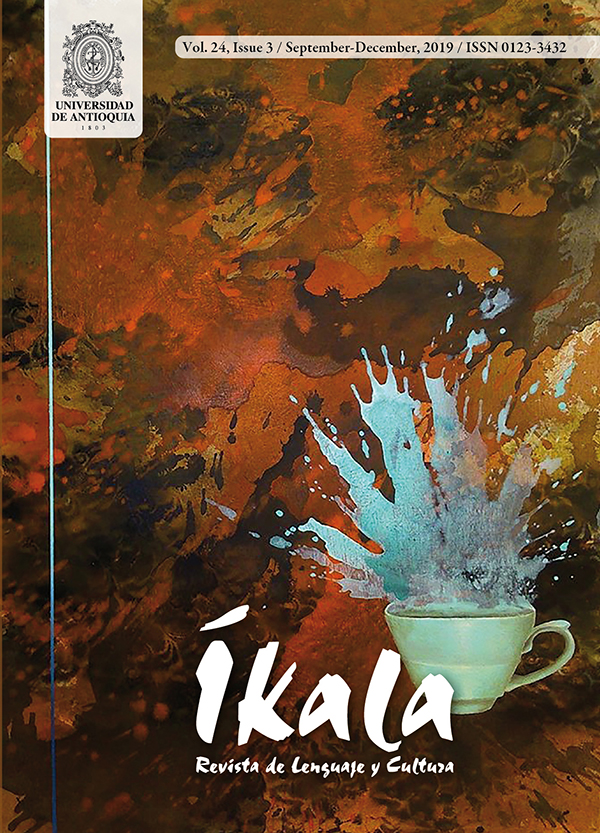Ensino em equipe como um modelo alternativo na formação prática de professores de inglês: um estudo de caso no Chile
DOI:
https://doi.org/10.17533/udea.ikala.v24n03a03Palavras-chave:
formação de professores de inglês, ensino em equipe, práticas pedagógicas, ChileResumo
Nas últimas décadas a integração de práticas progressivas tornou-se uma tendência mundial na formação inicial de professores de inglês como língua estrangeira. Nesse contexto, observa-se uma necessidade de investigar modelos alternativos que permitam o desenvolvimento de práticas reflexivas e colaborativas. Esta pesquisa examina o modelo de ensino em equipe como um modelo alternativo na formação prática de professores de inglês. A pesquisa é um estudo de caso enquadrado na tradição qualitativa e examina a experiência de ensino em equipe de um grupo de professoras em formação de pedagogia em inglês no Chile. Os resultados desta pesquisa sugerem que o modelo de ensino em equipe promove uma retroalimentação efetiva entre pares que impacta diretamente no desenvolvimento profissional e no desenvolvimento da identidade das professoras em formação, e é igualmente efetivo na formação de professores de inglês como língua estrangeira.
Downloads
Referências
Aravena, F. (2013). Desarrollando el modelo colaborativo en la formación docente inicial: la autopercepción del desempeño profesional del practicante en acción. Estudios pedagógicos (Valdivia), 39(1), 25-44.
Baeten, M., & Simons, M. (2014). Student teachers' team teaching: Models, effects, and conditions for implementation. Teaching and Teacher Education, 41, 92-110. doi:http://dx.doi.org/10.1016/j.tate.2014.03.010
Baeten, M., & Simons, M. (2016). Student teachers´ team teaching: how do learners in the classroom experience team-taught lessons by student teachers? Journal of Education for Teaching: International Research and Pedagogy, 42(1), 93-105. doi:10.1080/02607476.2015.1135226
Dang, T.K. A. (2013). Identity in activity: Examining teacher professional identity formation in the paired-placement of student teachers. Teaching and Teacher Education, 30(0), 47-59. doi:http://dx.doi.org/10.1016/j.tate.2012.10.006
Díaz, C., & Bastías, C. (2012). Una aproximación a los patrones de comunicación entre el profesor mentor y el profesor-estudiante en el contexto de la práctica pedagógica. Educación XXI: Revista de la Facultad de Educación, 15(1), 241-263
Díaz, C., Alarcón, P., & Ortiz, M. (2015). A case study on EFL teachers’ beliefs about the teaching and learning of English in public education. Porta Linguarum, 23, 171- 186.
Glas, K. (2016). Opening up ‘spaces for manoeuvre’: English teacher perspectives on learner motivation. Research Papers in Education, 31(4), 442-461.
Heo, J., & Mann, S. J. (2015). Exploring team teaching and team teachers in Korean primary schools. English Language Teacher Education and Development, 17, 13-
Honigsfeld, A., & Dove, M. G. (2012). Coteaching and other collaborative practices in the EFL/ESL classroom : rationale, research, reflections, and recommendations. The United States of America: Information Age Publishing, Inc.
Johnson, K. E. (2009). Second language teacher education: a sociocultural perspective. New York: Routledge.
Johnson, K. E., & Golombek, P. R. (2016). Mindful L2 Teacher Education: A Sociocultural Perspective on Cultivating Teachers' Professional Development: Taylor & Francis.
Merriam, S. (2009). Qualitative research: a guide to design and implementation (Rev. & expanded ed.). San Francisco: Jossey-Bass
Ong’ondo, C., & Jwan, J. (2009). Research on student teacher learning, collaboration and supervision during the practicum: A literature review. Educational Research and Review, 4(11), 515-524.
Park, J.-E. (2014). English co-teaching and teacher collaboration: A micro-interactional perspective. System, 44, 34-44. doi:http://dx.doi.org/10.1016/j.system.2014.02.003
Saldana, J. (2012). The Coding Manual for Qualitative Researchers. London: SAGE Publications.
Rodríguez, F. (2014). La co-enseñanza, una estrategia para el mejoramiento educativo y la inclusión. . Revista latinoamericana de educación inclusiva, 8(2), 219-233.
Sorensen, P. (2014). Collaboration, dialogue and expansive learning: The use of paired and multiple placements in the school practicum. Teaching and Teacher Education, 44, 128-137. doi:http://dx.doi.org/10.1016/j.tate.2014.08.010
Yang, P. . 2013. "Two heads are better than one: Team teaching in TESOL internship." Studies About Languages 23:113-125.
Yang, P. (2014). One Stone, Two Birds: Maximizing Service Learning Outcomes through TESOL Practicum. English Language Teaching, 7(5), 120-127.
Zeichner, K. (2006). Reflections of a University-Based Teacher Educator on the Future of College- and University-Based Teacher Education. Journal of Teacher Education, 57(3), 326-340. doi:10.1177/0022487105285893
Downloads
Publicado
Como Citar
Licença
Copyright (c) 2019 Íkala

Este trabalho está licenciado sob uma licença Creative Commons Attribution-NonCommercial-ShareAlike 4.0 International License.












